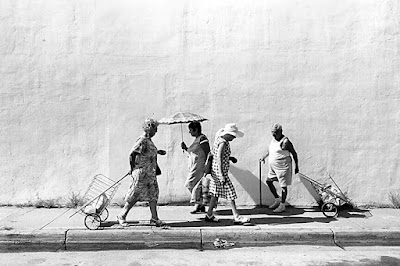A fascinating journey by a pair of filmmakers that details the work of a pair of photographers who helped document a Jewish community and a piece of the history of Miami, Florida, that has now pretty much ceased to exist, THE LAST RESORT proves a small, precise and beautifully handled little documentary about some wonderful archival photography and the two very different fellows who took it. As good as is the photography itself -- and it is very good -- the tale told here of one of the photographers proves equally compelling.
In just a brief 70 minutes, we are made privy to what seems like an entire community of retired Jews -- quite a few of
them Holocaust survivors -- who made their permanent, often final home here in Florida. The documentary is a combination of history, Sweet and Monroe's photos, older archival shots, and interviews with a wide range of people -- from friends and family to residents and their younger relatives. One of the latter includes noted filmmaker Kelly Reichardt (Certain Women).
Although TrustMovies cannot find any reference to the "writers" of the film, he is guessing that may have been Scholl and Tabsch, as well -- both of whom are South Florida residents and filmmakers. Whoever wrote the narration of The Last Resort, it is very well done, providing oodles of info in an entertaining, fast-moving fashion.
But it is the photo array that certainly seals the deal. You could hardly ask for more different styles that Sweet and Monroe offered -- the former shot colorful, off-the-cuff photos (as above) that captured the moment and people with delight and glee but zero sense of anything judgmental; the latter shot only in black-and-white (below), in a much more formal, artful manner.
Both styles work beautifully and actually manage to complement each other. Though the two photographers often ribbed each other about how each chose to work, they remained close for a long while and quite committed to their project of recording this fading community.
Although Gary Monroe is the photographer who is still with us, the movie devotes much of its narration to Andy Sweet. Little wonder, as his story is by far the most -- in movie terms, at least -- melodramatic and compelling. It is also hugely sad, but difficult to write about without giving away spoilers.
We see much more of Sweet's life, from his early years onto teen youth and adulthood, with Monroe providing narration and updates, as needed. In fact, Sweet and his story begin to take over the film from maybe the midway point onwards.
This is not a bad thing, since his story is such a mind-boggling one, and the Miami Jewish community is mostly shown us only by the photos the two men took. Both Sweet and the community are gone now, yet their histories survive, thanks to this fine little movie and the photos -- the reclamation of which the documentary's final section is devoted -- that tell the story.














No comments:
Post a Comment